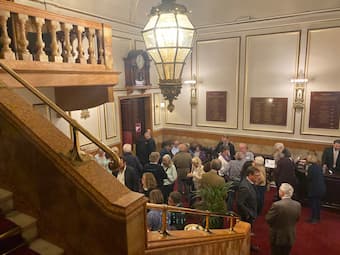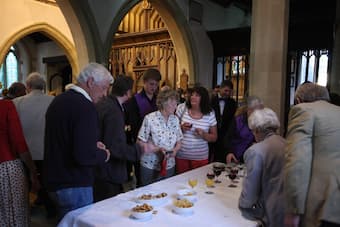
Wigmore Hall Foyer © Felix Wilson
British pianist Stephen Hough thinks it is, and he makes a persuasive case for it in an article for The Guardian, reminding us that coronavirus has forced us to rethink how we organise and attend concerts.
Those who decry the loss of the interval, claiming that it is part of a long-standing tradition in concert-giving and going, have perhaps forgotten, or do not know, that the standard format of the evening concert, as we know it today, has actually only been in existence for about 100 years. The interval, usually lasting about 20 minutes, is a chance for a pause in the programme and an opportunity for the audience to enjoy refreshments and a “comfort break” (which for ladies often means standing in a queue for the loo – why are there never enough ladies’ lavatories at concert venues?).
After you’ve queued for the loo, there’s scant time to enjoy a drink, for which you have probably also had to queue at the bar, before the audience bell sounds and it’s time to return to the auditorium, having gulped down an expensive glass of wine far too quickly to really enjoy it.
Personally, I’ve always found the interval a frustratingly rushed affair, and in order to enjoy it, one has to be well-organised enough to order an interval drink beforehand and be ready to dash off to the bar as soon as the performers have left the stage at the end of the first half.
Wolfgang Amadeus Mozart: Piano Concerto No. 21 in C Major, K. 467, “Elvira Madigan” (cadenza by M. Uchida) – II. Andante (Mitsuko Uchida, piano; Cleveland Orchestra; Mitsuko Uchida, cond.)

Anxieties over the spread of coronavirus mean that mingling with others in the often crowded concert hall foyer may not be a good idea… © The Crown Singers
Stephen Hough makes the very valid point that for the performer, the interval can interrupt the flow of the programme, and while the audience may be merrily quaffing Prosecco, the performer is twiddling his/her thumbs in the green room, trying to maintain the appropriate levels of energy and adrenaline for the second half. And for the audience too, a break in the programme can disturb the flow: sometimes you just want the music to go on playing……
Anxieties over the spread of coronavirus mean that mingling with others in the often crowded space of the bar in the venue may not be such a good idea, and this further reinforces the argument for losing the interval and instead offering shorter concerts.
I am very much in favour of concerts of an hour or 80 minutes, rather than the full evening programme of around two hours. One of my chief frustrations when attending an evening concert is finding time to eat a meal (and one does not want to be the person whose stomach rumbles noisily during the quietest, most sublime moments of a Mozart slow movement!). If a concert starts at 7.30pm, a meal at 6pm is just too early; after the concert, at 9.30pm or 9.45pm, it is just too late. But if the concert lasts an hour and starts earlier, at, say 6.45pm or 7pm, one would have time for a civilised supper afterwards. And a later start time would allow one to dine beforehand and not feel rushed. There would be time to meet with friends – concert-going is a social as well as a cultural activity, after all – and I cannot imagine anything more pleasurable than a leisurely supper with concert companions after a particularly fine performance.
For more of the best in classical music, sign up to our E-Newsletter





I would feel short changed with a 60 minute evening concert. When you get older you may well find your views changing unless you have developed a cast iron bladder. An 80 minute concert with the last 15 mins ruined by the need to visit the bathroom.
The intermission allows the perfomers to relax as well. Surely they deserve a break.
I note that most rock/pop concert don’t have an interval just a break between the support act and the headliner for a sound check. But of course you can go to the loo or get a drink at any time. The music is suffienctly loud and most often people are standing so the disruption to others is insignificant.
I have noticed that jazz groups usually have a break after 40 minutes even when it is an informal late night jam session in a jazz bar. So perhaps it is the performers who need a break in all three cases.